
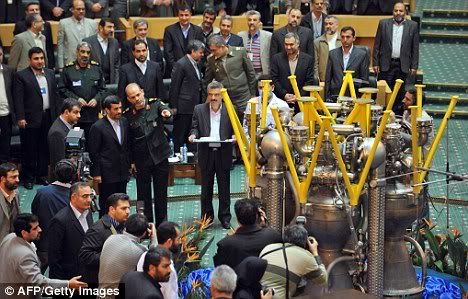
Ahmadinejad, centre left, is told about the motor of a satellite rocket during the unveiling ceremony in Tehran today. The West is concerned Iran is using its nuclear and space industries to develop atomic and ballistic weapons
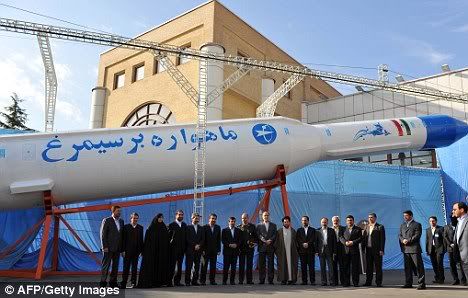
Ahmadinejad, 7th left, poses with government officials underneath the Simorgh (Phoenix) home-built satellite rocket during the unveiling ceremony in Tehran today, after hailing the successful launch of Kavoshgar 3 (Explorer) rocket
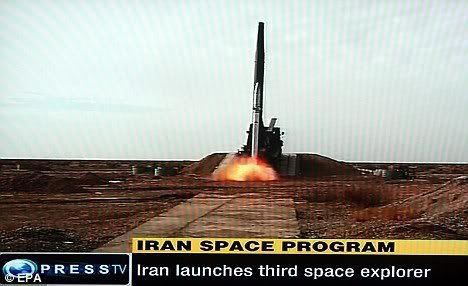
New fears? Press TV footage shows the launch of Iran's new Kavoshgar 3 rocket at an undisclosed location this morning
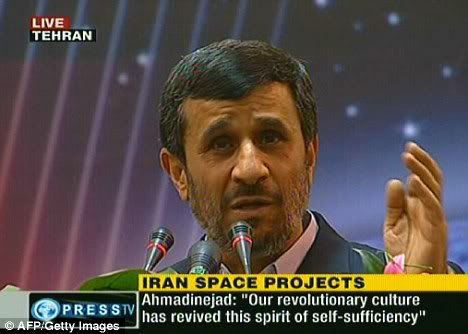
Concession: Iranian president Mahmoud Ahmadinejad appeared on TV last night to say he had 'no problem' sending enriched uranium abroad
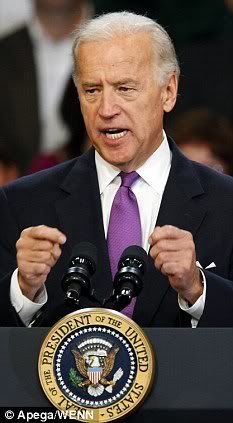
Attack: Joe Biden
Head of Atomic Energy Organization of Iran (AEOI) Ali Akbar Salehi said Iran is currently talking with some countries to swap its low-grade uranium for the high- grade uranium needed for a research reactor in Tehran, Iran's Labor news agency (ILNA) reported on Wednesday.
Rejecting any final agreement on the uranium swap with some countries which are able to produce 20 percent enriched uranium, Salehi said "the talks are currently underway and we will announce the final agreements."
Asked whether Iran has entered the negotiations with countries other than France and Brazil, Salehi, who is also Iran's vice president, said there are a number of countries involved in the swap and one of them is from Asia, but he refused to specify the Asian state as Japan.
Iranian president Mahmoud Ahmadinejad said Tuesday that the country is ready to ship its low-enriched uranium abroad for further enrichment as requested.
Under a draft deal brokered by the international nuclear watchdog, most of Iran's existing low-grade enriched uranium, nuclear fuel for its research reactor, will be shipped to Russia and France, where it will be processed into fuel rods with a purity of 20 percent.
The higher-level enriched uranium will then be transported back to Iran. Tehran had been standing against the deal till Tuesday.
Western countries have accused Iran of covertly building nuclear weapons, but Tehran maintains that its nuclear program is peaceful and aims to generate electricity for civilian use.
Petraeus says strike on Iran could spark nationalism
A military strike on Iran could have the unintended consequence of stirring nationalist sentiment to the benefit of Tehran's hard-line government, U.S. General David Petraeus told Reuters.
Iran's June election gave President Mahmoud Ahmadinejad a second term but sparked the worst internal crisis in the Islamic Republic's history, putting internal pressure on a government already facing the threat of more sanctions over its nuclear program.
"It's possible (a strike) could be used to play to nationalist tendencies," Petraeus, head of the U.S. Central Command region, which includes Iran, said in an interview this week.
"There is certainly a history, in other countries, of fairly autocratic regimes almost creating incidents that inflame nationalist sentiment. So that could be among the many different, second, third, or even fourth order effects (of a strike)."
Tensions over Iran's nuclear program have set off speculation that Israel could make good on veiled threats to hit its arch-foe pre-emptively. But Israel's envoy to Washington said in December the U.S.-Israeli dialogue on Iran has not reached the point of discussing the military option.
U.S. officials, including Defense Secretary Robert Gates, have warned that any strike on Iran would not stop the Islamic Republic from pursuing nuclear weapons. Instead, it would only delay Tehran, an opinion Petraeus said he shared.
Dennis Blair, the U.S. director of national intelligence, told Congress on Tuesday that Iran was keeping open the option of developing nuclear weapons but that it remained unclear whether Tehran had the political will to do so.
Petraeus, commenting on advances of Iran's nuclear program, said: "On the one hand, there is no question that there has been a continuation of various aspects of the nuclear program but I'm not sure it has always proceeded as rapidly as has been projected at various times."
GRADUAL BOOST IN DEFENSES
Ahmadinejad said on Tuesday Iran was ready to send its enriched uranium abroad in exchange for nuclear fuel under a plan the West hopes will stop the material from being used for atomic bombs.
The same day, Iran also said it would soon hang nine more rioters over unrest that erupted after the June presidential vote, which protesters said was rigged.
Petraeus cautioned that the "big winner" of the election had been Iran's security apparatus, expanding the influence the Revolutionary Guards Corps, including its elite Qods force.
"It's gone from I think a theocracy that had democratic elements in a narrow spectrum ... to a government that is the result of a hijacked election and a regime that is kept in power by security services to a vastly greater extent than has ever been the case before," he said.
Asked how this changed prospects diplomatically, Petraeus said: "I don't think it simplifies the situation for those who are trying to pursue diplomacy if the role of the Foreign Ministry is diminished further and the role of the Qods force has been augmented."
To counter the Iranian threat and reassure anxious Gulf allies, the United States has expanded land- and sea-based missile defense systems in and around the Gulf.
Petraeus stressed it had been a gradual build-up -- an approach shared by both the Obama and Bush administrations -- and not something sparked by events in Iran in recent months.
"This has been built up over years of inflammatory Iranian rhetoric, alarming Iranian activities and Iranian provision of arms, money, training, explosives and direction in some cases to a variety of different extremist elements," Petraeus said.
Iran has accused the United States of seeking to stoke "Iran phobia" in the Middle East by deploying the missile defense systems in the Gulf.
The United States and major European allies are pursuing broader U.N. sanctions against Iran due to its disputed nuclear activity. The United States, Britain, Germany and France have called for a fourth round of U.N. measures against Iran for refusing to halt uranium enrichment activities as demanded by five Security Council resolutions.
Mix Reaction from Iran
*
Iran has backed down in a nuclear row with the West over sending its enriched uranium abroad.
President Mahmoud Ahmadinejad appeared for the first time last night to give way over a UN-brokered proposal that would see him send the country's enriched uranium overseas to be turned into nuclear fuel.
The move, if carried through, would hobble Tehran's ability to build a nuclear bomb.
However the apparent concession was undermined when Iran test-fired a satellite rocket today, sparking new fears in the West that Tehran is using its space industry to develop an atomic weapon.
The U.N. nuclear watchdog, the International Atomic Energy Agency (IAEA), has brokered the proposed plan under which Iran would send its low-enriched uranium abroad in exchange for more highly enriched fuel for a medical research reactor.
Iran has always claimed its uranium enrichment plan was to produce nuclear fuel for the country, a claim almost universally doubted throughout the West.
Tehran had already missed a December 31, 2009 deadline to accept the deal when it proposed a new deal of its own last month.
Last night Ahmadinejad finally appeared to be giving in.
'We have no problem sending our enriched uranium abroad,' Ahmadinejad told state television.
'We say: we will give you our 3.5 percent enriched uranium and will get the fuel. It may take 4 to 5 months until we get the fuel.
'If we send our enriched uranium abroad and then they do not give us the 20 per cent enriched fuel for our reactor, we are capable of producing it inside Iran,' he said.
In Washington, a U.S. official, speaking on condition of anonymity, said: 'If Iran has something new to say, we are prepared to listen.'
Iranian Foreign Minister Manouchehr Mottaki said the uranium could be exchanged in Turkey, Brazil or Japan if agreement is reached.
Iran has faced intense Western pressure, under threat of new sanctions, to implement the plan.
However the conciliatory gesture came as Tehran launched a new rocket, the home-built Kavoshgar-3 (Explorer-3) satellite rocket.
Ahmadinejad, speaking at a ceremony to unveil three new satellites and other space technology achievements today, said the Islamic Republic hoped to send astronauts into space soon.
Western nations fear Iran is seeking to build nuclear bombs and are concerned that the long-range ballistic technology used to put satellites into orbit can also be used to launch warheads.
Iran says it has no plans to do so.
The Iranian president made no mention of the nuclear row at today's aerospace event
The Kavoshgar-3 rocket would transfer electronic data and live footage back to earth.
Press TV showed footage of a rocket blasting off from a launchpad in the desert, leaving a thick vapour trail. Other Iranian media said it was a test launch.
One year ago, Iran launched a domestically made satellite into orbit for the first time. It has said the launch of the Omid satellite was for peaceful telecommunications and research purposes.
In December, Iran said it test-fired a long-range, upgraded Sejil 2 missile.
Gordon Brown at the time said the launch was of serious concern to the international community and underlined the case for tougher sanctions.
On Monday, a Pentagon report said Iran had expanded its ballistic missile capabilities and posed a significant threat to U.S. and allied forces in the Middle East region.
To counter what Washington sees as the Iranian threat, the United States has expanded land- and sea-based missile defence systems in and around the Gulf, according to U.S. officials.
Ahmadinejad spoke after U.S. Vice President Joe Biden launched an outspoken attack on Tehran last night.
Mr Biden said Iran's leaders were 'sowing the seeds of their own destruction' through their harsh crackdown on anti-government unrest.
Speaking on MSNBC, he indicated Washington was sticking to its dual track on Iran of diplomacy and sanctions.
'It's time (for the United States) to reach out, demonstrate that we're not the problem, the hand that gets rejected, and be able to have the whole world stay with us ... against the Iranian government,' he said.
Asked whether it was time for 'regime change' in Iran since President Barack Obama's effort to engage the Islamic republic had failed to make progress, he said: 'The people of Iran are thinking about, the very people marching, they're thinking about regime change.'
Mr Biden said: 'We are moving with the world to put sanctions on them. I think that we have moved in the right direction in a measured way.'
Yesterday Gordon Brown claimed to also be considering sanctions.
Western powers accuse Iran of trying to develop nuclear weapons under cover of a civilian enrichment program that Tehran says will fuel a future network of nuclear power plants so it can export more oil and gas.
Ahmadinejad's statement on the nuclear issue - on which Supreme leader Ayatollah Ali Khamenei has the last word - was apparently the first time a top official had publicly accepted exchanging low-enriched uranium for nuclear medicine fuel off Iranian soil.
'We made a good faith and balanced offer regarding the Tehran research reactor,' White House spokesman Mike Hammer said in Washington.
'We believe it makes sense for all parties. If Mr Ahmadinejad's comments reflect an updated Iranian position, we look forward to Iran informing the IAEA.'
Mottaki and the IAEA said last week a deal on uranium enrichment was still possible, despite Western diplomats saying Tehran had in effect turned down the proposal.
Under the proposed deal Tehran would transfer 70 per cent of its low-enriched uranium (LEU) abroad for conversion into special fuel rods to keep the nuclear medicine reactor running.
The plan aims to reduce Iran's reserves below the quantity needed for the fissile core of a nuclear weapon, if the material were refined to a high degree of purity.
'For us the real matter is to reach an agreement about fuel exchange,' Mottaki said in an interview with Turkish television TRT.
'If we can reach an agreement on the formula then we can talk about the place. About timing we can always talk. Turkey might be a place, Brazil or Japan might be a place.'
The United States and European allies are pursuing broader UN sanctions against Iran over its nuclear activity.
The United States, Britain, Germany and France seek a fourth round of UN measures against Iran for refusing to halt uranium enrichment as demanded by five Security Council resolutions.
Cracking down on internal dissent, Iran said it would soon hang nine more rioters over unrest that erupted after the June presidential vote. The opposition said the poll was rigged.
'Nine others will be hanged soon. The nine, and the two who were hanged on Thursday, were surely arrested in the recent riots and had links to anti-revolutionary groups,' said senior judiciary official Ebrahim Raisi, the semi-official Fars news agency reported.
The two men hanged last week were among 11 people sentenced to death on charges including 'waging war against God'.
The June election gave Ahmadinejad a second term, but sparked the worst internal crisis in the Islamic Republic's history. The government denied any fraud in the voting.
Opposition leader Mirhossein Mousavi, a former prime minister, said the repression showed the 1979 revolution that overthrew the U.S.-backed Shah 'had not achieved its goals'.
---
---
----
---
---






0 comments:
Post a Comment